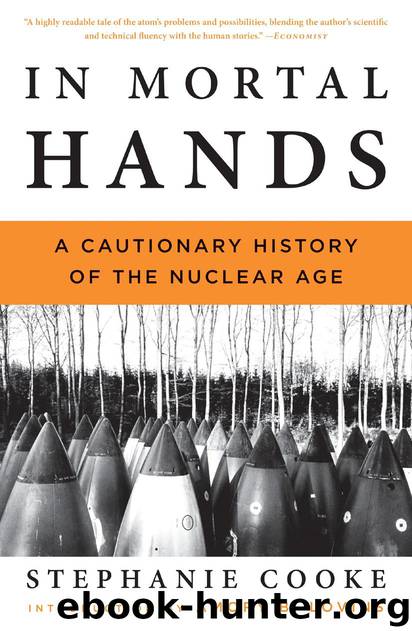In Mortal Hands by Stephanie Cooke

Author:Stephanie Cooke
Language: eng
Format: mobi
Publisher: Bloomsbury Publishing Plc
Published: 2005-12-20T21:00:00+00:00
14
That’s the Way
We Play the Game
Five years after golda meir’s meeting with Nixon, when India exploded its first nuclear weapon in May 1974, the Washington press corps naturally turned its attention to the White House for comment. But the real action was a few blocks away in the offices of Edlow International. A year earlier, Sam Edlow’s son Jack had flown to Tennessee for what was no ordinary meeting. Two men from India’s Atomic Energy Commission had wanted to talk to him about shipping nuclear fuel from the United States to India. “They were living in a rooming house with one bedroom that had two beds,” the younger Edlow, then twenty-five, recalled. “They cooked on an electric plate. I don’t know what I expected. I sat in their room while they ate their food and struck a deal to ship fuel to India.”1
By coincidence, on the day Indians conducted their test, the Edlows’ first Indian fuel consignment was on a truck somewhere between Tennessee and the port of New York. Its ultimate destination was the site of the General Electric nuclear plant at the industrial town of Tarapur in northwest India near Bombay, birthplace of Homi Bhabha, the father of the Indian nuclear program, who had died eight years earlier in a plane crash.
Aware of the shipment, AEC officials were quietly wringing their hands. They knew that by allowing it to go through they risked undermining the Non-Proliferation Treaty, which they were still trying to persuade other nations to sign. How could the United States justify continuing its nuclear trade with India when the treaty’s very purpose—to stop other nations acquiring nuclear weapons—had just been so flagrantly ignored? Yet as time went on and these same officials found themselves embroiled in an enormous political controversy over nuclear trade with India, the argument was turned on its head: U.S. influence in India would be completely lost, they would maintain, if export approvals were terminated. This was a spurious contention in one way, because it was precisely the kind of thinking that had led to the problem in the first place. Nevertheless it highlighted the conundrum—could nuclear energy be developed and at the same time effectively controlled?
For India, the Tarapur shipments were critical because the country did not have the capability at the time to enrich uranium; nor did it have much in the way of indigenous natural uranium. Realizing all this, an AEC official called Sam Edlow after learning about the explosion and told him he should have the truck turned around and returned to Tennessee with the Indian fuel. Edlow refused, saying that he had an export license and that in order for him to comply with the request the AEC would have to rescind the licence.
“I was blunt,” Edlow wrote in an unpublished memoir. “No cancel the export license, out it goes... After all, that’s the way we play the game.”2
Download
This site does not store any files on its server. We only index and link to content provided by other sites. Please contact the content providers to delete copyright contents if any and email us, we'll remove relevant links or contents immediately.
| Alternative & Renewable | Drilling Procedures |
| Electric | Fossil Fuels |
| Mining | Nuclear |
| Power Systems |
Whiskies Galore by Ian Buxton(40331)
Introduction to Aircraft Design (Cambridge Aerospace Series) by John P. Fielding(32338)
Small Unmanned Fixed-wing Aircraft Design by Andrew J. Keane Andras Sobester James P. Scanlan & András Sóbester & James P. Scanlan(32141)
Craft Beer for the Homebrewer by Michael Agnew(17446)
Turbulence by E. J. Noyes(7039)
The Complete Stick Figure Physics Tutorials by Allen Sarah(6638)
Kaplan MCAT General Chemistry Review by Kaplan(6053)
The Thirst by Nesbo Jo(5785)
Bad Blood by John Carreyrou(5769)
Learning SQL by Alan Beaulieu(5411)
Weapons of Math Destruction by Cathy O'Neil(5036)
Man-made Catastrophes and Risk Information Concealment by Dmitry Chernov & Didier Sornette(4735)
iGen by Jean M. Twenge(4702)
Digital Minimalism by Cal Newport;(4540)
Life 3.0: Being Human in the Age of Artificial Intelligence by Tegmark Max(4507)
Audition by Ryu Murakami(4099)
1,001 ASVAB Practice Questions For Dummies by Powers Rod(4038)
Electronic Devices & Circuits by Jacob Millman & Christos C. Halkias(4027)
Pale Blue Dot by Carl Sagan(4001)
